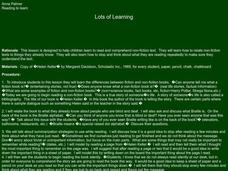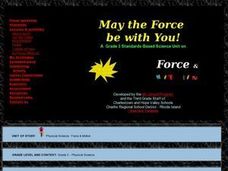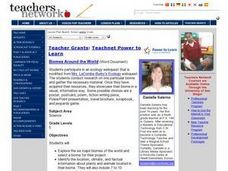Curated OER
Shrek
Students watch the movie Shrek and compose a text that displays an understanding of the film. Also, they create writing that reflects a critical analysis of content and a personal interpretation of the film's meaning.
Curated OER
"Wheels, Wings and Other Things"
Learners participate in various reading and writing activities related to the book "Wheels, Wings and Other Things" by Monica Hughes and Barbara Hunter. They participate in a shared reading activity, and write a new page for a book...
Curated OER
Robert Boyle and Experimental Methods
Students discuss the difference between the Baconian inductive method and the Aristotelian deductive approaches. They complete a given set of questions then discuss them with the class.
Curated OER
Eleanor Everywhere
Third graders read a biography on Eleanor Roosevelt. Using the text, they identify and discuss what she did to make a difference in the world. They discover what one person can do to help change the world.
Curated OER
Abolitionists in U.S. History
Young scholars read and discuss excerpts from the writings of Henry David Thoreau, Frederick Douglass and Sarah Parker Redmond. They compare and contrast the views of the three abolitionists concentrating on the experiences and reasons...
Curated OER
Slim Down to the Good Stuff by Summarizing
Students summarize a piece of literature using the technique "mapping" in this lesson. The technique involves 6 main steps: delete unimportant information, delete repeated information, substitute easy terms, add a series of event with...
Curated OER
Keep It Short!
Students examine the process of summarizing text. They participate in a class discussion, and read an assigned passage from their textbook, highlighting the main points of the text. Students then write a short summary of their...
Curated OER
Reading to Learn
Children learn to read and comprehend non-fiction text and explore how to relate non-fiction texts to things they already know. They then examine how to stop and think about what they are reading repeatedly to make sure they understand...
Curated OER
Radioactive Decay
Learners explore radioactive decay. Through various activities, students examine methods for permanent disposal of radioactive waste. After performing a random process experiment, learners compare the results to radioactive decay. ...
Curated OER
Focus on the Media
Learners critically examine news articles and editorials for attitudes of discrimination and prejudice. Students then complete checklist in which they analyze news reports for context, content, point of view, language, graphics, and...
Curated OER
Said Is Dead
Students revise writing to improve organization and word choice. They check for logic, order of ideas and precision of vocabulary. Students list different verbs for the word "said." They write dialogue in which the speakers tell a story...
Curated OER
Force & Motion
Third graders are introduced to the concepts of force and motion. In groups, they travel between stations to analyze the effect of force and motion on various objects. They research how various careers use these concepts as well.
Curated OER
Enrichment Activities - "Mrs. Frisby and the Rats of NIMH"
Fifth graders read the novel "Mrs. Frisby and the Rats of NIMH." They discuss the various characters in the book, and the different types of conflict that take place within the book. They also research owls and rats to make comparisons...
Curated OER
Famous People of the Gold Rush
Fourth graders research a famous person from the Gold Rush era. Using the Internet, they take notes from creditable websites and write their rough drafts of their paper. They use peer editing to check for spelling and grammar errors. ...
Curated OER
Lessons in Loss, Year of Impossible Goodbyes
Students determine how the Korean people dealt with the loss of their land and traditional lifestyle in response to invasion and emigration. They create a list of items and people they have lost. From this they complete a journal...
Curated OER
Mind Libs
Students are told that they are going to do a fun activity similiar to "Mad Libs" in which they "fill in the blanks" to create funny stories. They are given a copy of Mind Libs Reproducible #1. Students follow the word suggestions in...
Curated OER
Biomes Around The World
Fifth graders explore the six major biomes found in the world and choose one for further research and presentation. Using internet sources, they identify the major characteristics of their biome and synthesize their information into a...
Curated OER
A Cultural Defense to Crime?
Students define a "defense to a crime" and identify various defenses to crimes in Utah. They examine "cultural defense" and apply it to case studies.
Curated OER
Who Killed the Red Baron?
Students explore, examine and analyze how to apply deductive thinking to evaluate evidence and draw conclusions. They view and critique a handout called "Who Made the Mess?"and a facts sheet on the handout. They divide up into groups and...
Curated OER
Virginia Woolf: A Room of One's Own - Shakespeare's Sister
Students, after reading and analyzing, "A Room of One's Own," by Virginia Woolf, analyze how creating and defending one's position as well as how narrative functions as a rhetorical device. They evaluate and focus in on Shakespeare's...
Curated OER
PETA Pressure
High schoolers examine what a "target audience" is and evaluate the PETA website for tactics that exploit the characteristics of their target audience. They read and discuss a handout, analyze the PETA website in small groups, and...
Curated OER
Wikiality
Students explore Wikipedia and explore the false information that appears on the site. They research and discuss the potential pitfalls of using Wikipedia and examine the ease with which false or misleading information appears on the...
Curated OER
State Report Booklet- Worksheet
In this state report booklet set of worksheets, students describe and draw information about the attributes of an assigned state. They write the name of the state symbols, such as the bird, fish, or flag, at the top of the page, and...
Curated OER
Separating Fact From Fiction In Historical Fiction
In this language arts worksheet, students look for the facts and fiction in the novel Number The Stars. They separate them into the two different columns.
Other popular searches
- Factual Description
- Factual Recount
- Factual Paragraph
- Factual Information
- Factual Description Writing
- Reading Factual Texts
- Factual Texts
- Factual Writing
- Factual Recount Writing
- Factual Description Animals
- Factual Recount Text Type
- Factual Text Elements

























